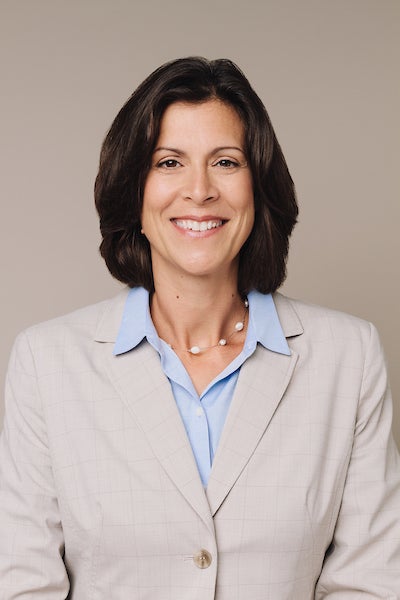KINGSTON, R.I. — February 27, 2020 — A University of Rhode Island College of Nursing professor has won the Association of Women’s Health, Obstetric and Neonatal Nurses’ premier award for an article based on her groundbreaking study in which she challenges expected patterns of infant weight loss after birth.
The national association awarded University of Rhode Island Assistant Professor Diane DiTomasso the 2020 Best of JOGNN Award for her article, “Systematic Review of Expected Weight Changes After Birth for Full-Term, Breastfed Newborns,” which she co-wrote with fellow URI Nursing Professor Mary Cloud. It is the top award offered by the Journal of Obstetric, Gynecologic and Neonatal Nursing each year.
The article summarizes findings from recent studies about infant weight, including two studies done by DiTomasso. She hopes the findings from this review will support changes in feeding recommendations for new mothers from the leading infant health care organizations. The American Academy of Pediatrics, the International Lactation Consultant Association and the Academy of Breastfeeding Medicine have generally advised that infants should not lose more than 7% of weight after birth. Often, when weight loss is greater than 7%, formula is given to breastfed infants to help them gain weight.
However, in both of DiTomasso’s studies, she found that the average breastfed baby loses 8% of birth weight and that it is common for newborns to lose up to 10% of their body weight after birth. In her most recent study, she found that most babies who did lose more than 7% in the first two weeks still gained weight at an adequate pace over the next two weeks. In most cases, there is no need to incorporate formula, which can interfere with breastfeeding, potentially depriving infant and mother of the tremendous health benefits of exclusive breastfeeding.
“When you draw a line in the sand like that and state that babies should not lose more than 7% of their birth weight, this can cause a lot of worry for parents when greater weight loss occurs. Many times, this results in the use of formula supplementation. Breastfeeding can be thrown off track, even if you continue breastfeeding,” DiTomasso said. “It’s all about supply and demand. Early on, every time babies breastfeed, a signal is sent to the mom’s brain to produce more prolactin, the hormone that produces breast milk. So if you fill that baby’s belly with formula, he will often go longer without nursing simply because he’s full. Now mom is not getting enough messages to make more milk, and then you have potentially created a real supply problem. All of this may occur because of concern about weight loss which may not be justified in the first place.”
Most infant health organizations recommend exclusively breastfeeding infants for at least six months, and studies like DiTomasso’s confirm the health benefits of exclusive breastfeeding. Most new moms (83%) start out exclusively breastfeeding, but by three months of life, those rates plummet to 47%. Although there are lots of reasons why women choose to supplement breastfed infants with formula, DiTomasso’s studies show that concern about infant weight is a contributing factor.
“And that has major health implications,” said DiTomasso, who has more than 25 years of experience as an obstetrical nurse and lactation consultant. “Breastfeeding is completely dose-dependent, meaning the longer you breastfeed, the more benefits you have for both mom and baby. We want babies to breastfeed so that later in their lives they have less risk of obesity, cardiac disease, diabetes, cancer. We know breastfeeding can make a long-term difference in people’s health. What I would love to see is practice change so the organizations no longer say babies shouldn’t lose more than 7%. If 8-10 % is normal, and the baby is otherwise healthy and breastfeeding well, we shouldn’t be supplementing with formula.”
DiTomasso hopes her findings will influence pediatric care providers and encourage them to continue to support mothers in exclusively breastfeeding after babies experience a 7% weight loss. She recommends exclusive breastfeeding for six months, then continued breastfeeding for a year with complementary foods. “After that, it’s recommended that babies breastfeed as long as mother and child desire,” she said.
DiTomasso will receive her award during the 2020 AWHONN Convention June 13-17 at the Phoenix Convention Center in Phoenix, Arizona. Criteria for the award include originality of the work; clarity and scholarliness of the writing; potential to significantly affect the care of women, infants and/or childbearing families; and the interdisciplinary importance of the work. DiTomasso’s study also received an award from the Journal of Human Lactation last year.

